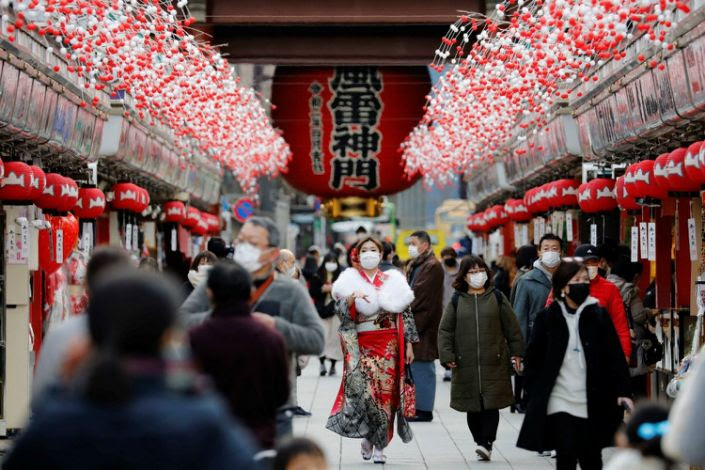
By — Shyamal Sinha
Prime Minister Yoshihide Suga has been wary about taking measures that would hamper economic activity, while he has put on a brave face against the mounting challenges of hosting the delayed Olympics in Tokyo this year.
Japan’s coronavirus cases topped 300,000 on Wednesday, while the death toll reached 4,187, public broadcaster NHK said.
As infections hover at record levels, straining the country’s medical system, opinion polls have shown a public increasingly opposed to holding the Summer Games and growing frustration with Suga.
In a weekend survey by NHK, just 16% of respondents said the Games should go ahead – down 11 percentage points from the previous poll last month – while a combined 77% thought they should be cancelled or postponed. The Games are set for July 23 to Aug. 8.
Even Takeshi Niinami, CEO of beverage giant Suntory Holdings and an economic adviser to Suga, told Reuters he was unsure whether the Olympics could be held as planned, and that a decision will likely be made by end-March.
Suga announced the expanded state of emergency to include Osaka, Kyoto, Hyogo, Fukuoka, Aichi, Gifu and Tochigi prefectures from Thursday at a task force meeting. He will hold a news conference 7 p.m. (1000 GMT).
The latest emergency declaration covering 55% of Japan’s population of 126 million is set to last through Feb. 7 and is much narrower in scope than the first one last spring. It focuses on combating transmission in bars and restaurants, while urging people to stay home as much as possible.
The government will also suspend an entry-ban exemption for business travellers from 11 previously designated countries and regions during the state of emergency.
Suga has been criticised for what many observers have said was a slow and confusing response to the pandemic. That is a sharp reversal from the strong support he enjoyed at the start of his tenure, when he was seen as a “man of the people” who could push through reforms.
Among the most controversial moves has been a scheme that subsidised local tourism, encouraging millions to travel domestically. That was put on hold late last year.
Political analyst Atsuo Ito said he saw two major problems with Suga’s response to the pandemic: that it was incremental and slow, and that he was a poor communicator despite having been the top government spokesman in his previous role as chief cabinet secretary.
“He has almost no skill at messaging. Even at press conferences he’s looking down and reading notes. That doesn’t invite trust from citizens … The result is that his support ratings are falling,” Ito said.
Suga’s approval rate fell below those who disapproved for the first time in an NHK poll since he took office in September – by 40% to 41%.
The poll also showed 88% think Feb. 7 is too early to lift the state of emergency – a view shared by many experts.
“It’s very unlikely we’ll see cases go down after just a month,” said Yoshihito Niki, an infectious disease specialist and professor at Showa University Hospital.
“Japan has been called a success story and there’s been discussion about the so-called Factor X – something that makes the Japanese more resistant to the virus – but that’s a complete fantasy,” Niki said.
source -News 18












